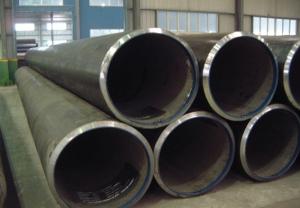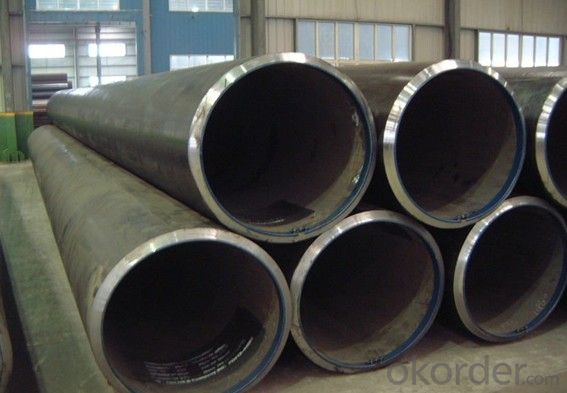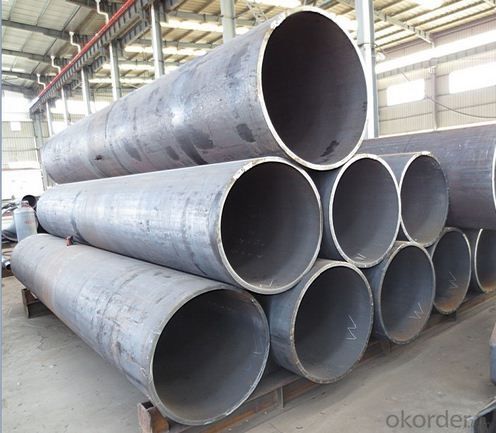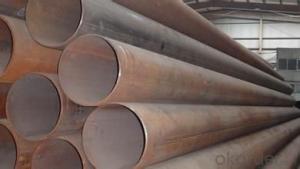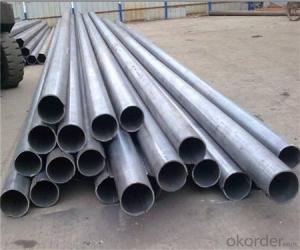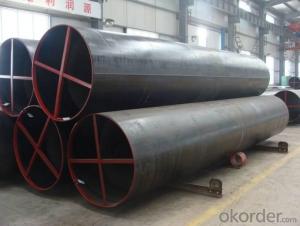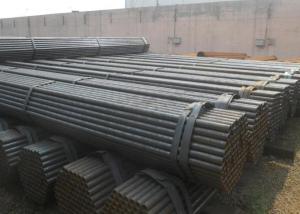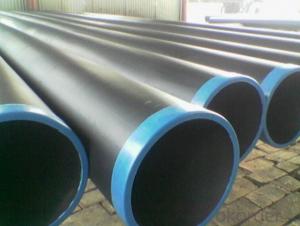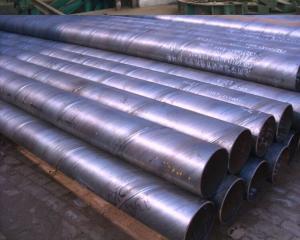Longitudinally welded steel pipe LSAW / ERW
- Loading Port:
- China Main Port
- Payment Terms:
- TT or LC
- Min Order Qty:
- 25MT m.t.
- Supply Capability:
- 9000MT m.t./month
OKorder Service Pledge
OKorder Financial Service
You Might Also Like
Product Description:
1、Structure of API5L CARBON STEEL Longitudinally welded steel pipe LSAW Description:
2、Main Features of the API5L CARBON STEEL Longitudinally welded steel pipe LSAW
• High manufacturing accuracy
• High strength
• Small inertia resistance
• Strong heat dissipation ability
• Good visual effect
• Reasonable price
LSAW PIPE is formed by drawing a solid billet over a piercing rod to create the hollow shell. As the manufacturing process does not include any welding, seamless pipes are perceived to be stronger and more reliable. Historically seamless pipe was regarded as withstanding pressure better than other types, and was often more easily available than welded pipe.
3、 API5L CARBON STEEL Longitudinally welded steel pipe LSAW Images:
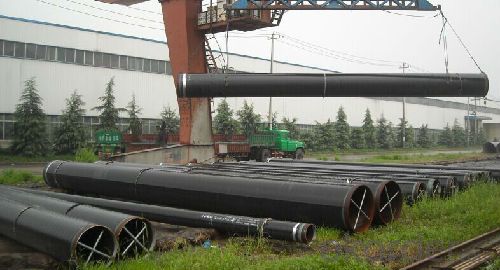
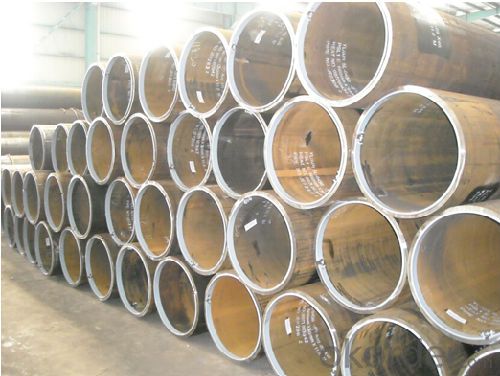
- Q: What are the different methods of pipe cutting for steel pipes?
- There exists a variety of techniques for cutting steel pipes, each tailored to specific circumstances and demands. Some of the most prevalent techniques are as follows: 1. Manual Pipe Cutters: These handheld tools are frequently employed for cutting smaller steel pipes. They typically feature a rotating cutting wheel that gradually creates a groove until the pipe is severed. Portable and relatively user-friendly, manual pipe cutters are suitable for on-site cutting tasks. 2. Hacksaw: The use of a hacksaw is a traditional and cost-effective means of cutting steel pipes. This method requires physical exertion and time; however, it can effectively cut pipes with smaller diameters. It is crucial to use a fine-toothed blade and apply steady pressure to ensure a clean and precise cut. 3. Reciprocating Saw: Also known as a sawzall, the reciprocating saw is a power tool that employs a back-and-forth cutting motion to swiftly and efficiently cut through steel pipes. These versatile saws can accommodate different types of blades to handle various pipe sizes and thicknesses. 4. Band Saw: Band saws are commonly employed in industrial settings for the purpose of cutting large steel pipes. These saws feature a continuous loop of teethed metal blade that moves on wheels, enabling precise and rapid cutting. Band saws are ideal for cutting large-diameter pipes and can be operated manually or fully automated for high-volume cutting tasks. 5. Pipe Cutting Machines: Pipe cutting machines are often utilized to achieve precise and consistent cuts. These machines are designed to cut steel pipes swiftly and accurately, making them suitable for large-scale industrial applications. Depending on the machine and requirements, various cutting methods like abrasive cutting, flame cutting, or plasma cutting can be employed. It is important to note that the selection of a pipe cutting method depends on factors such as pipe diameter, thickness, location, precision requirements, and available resources. It is imperative to adhere to proper safety precautions when working with any cutting method to prevent injury or damage to the pipes.
- Q: How are steel pipes used in the agricultural sector?
- Steel pipes are commonly used in the agricultural sector for various purposes such as irrigation, drainage, and livestock handling. They are used to transport water from a source to fields, as well as to distribute water evenly across crops through irrigation systems. Steel pipes also help in draining excess water from fields and preventing waterlogging. Additionally, they are utilized for constructing fences, gates, and cattle handling facilities, ensuring the safety and containment of livestock.
- Q: How are steel pipes used in the construction of railways?
- Steel pipes are used in the construction of railways for various purposes, including the installation of track support structures, drainage systems, and signaling equipment. They provide strength and durability, ensuring the stability and longevity of railway tracks, while also facilitating the efficient flow of water and the installation of crucial communication and signaling components.
- Q: Can steel pipes be used for pharmaceutical manufacturing?
- Yes, steel pipes can be used for pharmaceutical manufacturing. Steel pipes are commonly used in various industries, including pharmaceutical manufacturing, due to their durability, strength, and resistance to corrosion. In pharmaceutical manufacturing, steel pipes are primarily used for fluid transportation, such as the transfer of chemicals, solvents, and other raw materials. They are also used for the distribution of process water, steam, and other utilities. Stainless steel pipes are particularly preferred in pharmaceutical manufacturing as they are highly resistant to corrosion and can withstand high temperatures and pressures. Moreover, stainless steel pipes have smooth surfaces, which prevent the accumulation of particles and facilitate easy cleaning and sterilization, essential requirements in pharmaceutical production. Overall, steel pipes are a reliable and suitable option for pharmaceutical manufacturing due to their robustness, resistance to corrosion, and ability to meet the stringent cleanliness and hygiene standards of the industry.
- Q: What is galvanized steel pipe?
- Galvanized steel pipe is a type of steel pipe that has been coated with a layer of zinc, which helps protect it from corrosion and rust. This coating also increases the pipe's longevity and makes it suitable for various applications, including plumbing, construction, and outdoor structures.
- Q: What are the different coating options available for steel pipes?
- There are several different coating options available for steel pipes, including epoxy coatings, polyethylene coatings, zinc coatings, and asphalt coatings. These coatings are applied to the exterior of the pipes to provide protection against corrosion, abrasion, and other environmental factors. Each coating option offers different benefits and is chosen based on the specific requirements of the project or application.
- Q: How do steel pipes handle water hammer in high-rise buildings?
- Steel pipes in high-rise buildings are designed to handle water hammer through various measures. Firstly, steel pipes have high strength and durability, allowing them to withstand the sudden pressure surges caused by water hammer. Additionally, steel pipes are often installed with shock absorbers or surge tanks to reduce the impact of water hammer. These devices absorb and dissipate the excess energy generated during water hammer, preventing damage to the pipes and fittings. Moreover, proper pipe sizing, layout, and support systems are implemented to minimize the effects of water hammer, ensuring the smooth and efficient flow of water in high-rise buildings.
- Q: How long do steel pipes last?
- Steel pipes can last for several decades, typically around 50 to 100 years, depending on various factors such as the quality of the steel, the environment they are exposed to, and proper maintenance and care.
- Q: Can steel pipes be bent or shaped?
- Yes, steel pipes can be bent or shaped using various techniques such as cold bending, hot bending, or by using specialized machinery like pipe benders.
- Q: What are the safety precautions when working with steel pipes?
- When working with steel pipes, it is important to follow safety precautions to minimize the risk of accidents and injuries. Some key safety measures include wearing appropriate personal protective equipment (PPE) such as gloves, safety glasses, and steel-toed boots to protect against cuts, burns, and falling objects. It is crucial to use proper lifting techniques or equipment when handling heavy steel pipes to avoid strains or back injuries. Additionally, workers should be cautious of potential hazards such as sharp edges, welding sparks, or exposure to hazardous materials. Regular inspection and maintenance of equipment and tools is necessary to ensure their safe operation. Proper training, awareness of surroundings, and adherence to safety protocols are essential for a secure working environment when dealing with steel pipes.
Send your message to us
Longitudinally welded steel pipe LSAW / ERW
- Loading Port:
- China Main Port
- Payment Terms:
- TT or LC
- Min Order Qty:
- 25MT m.t.
- Supply Capability:
- 9000MT m.t./month
OKorder Service Pledge
OKorder Financial Service
Similar products
Hot products
Hot Searches
Related keywords
